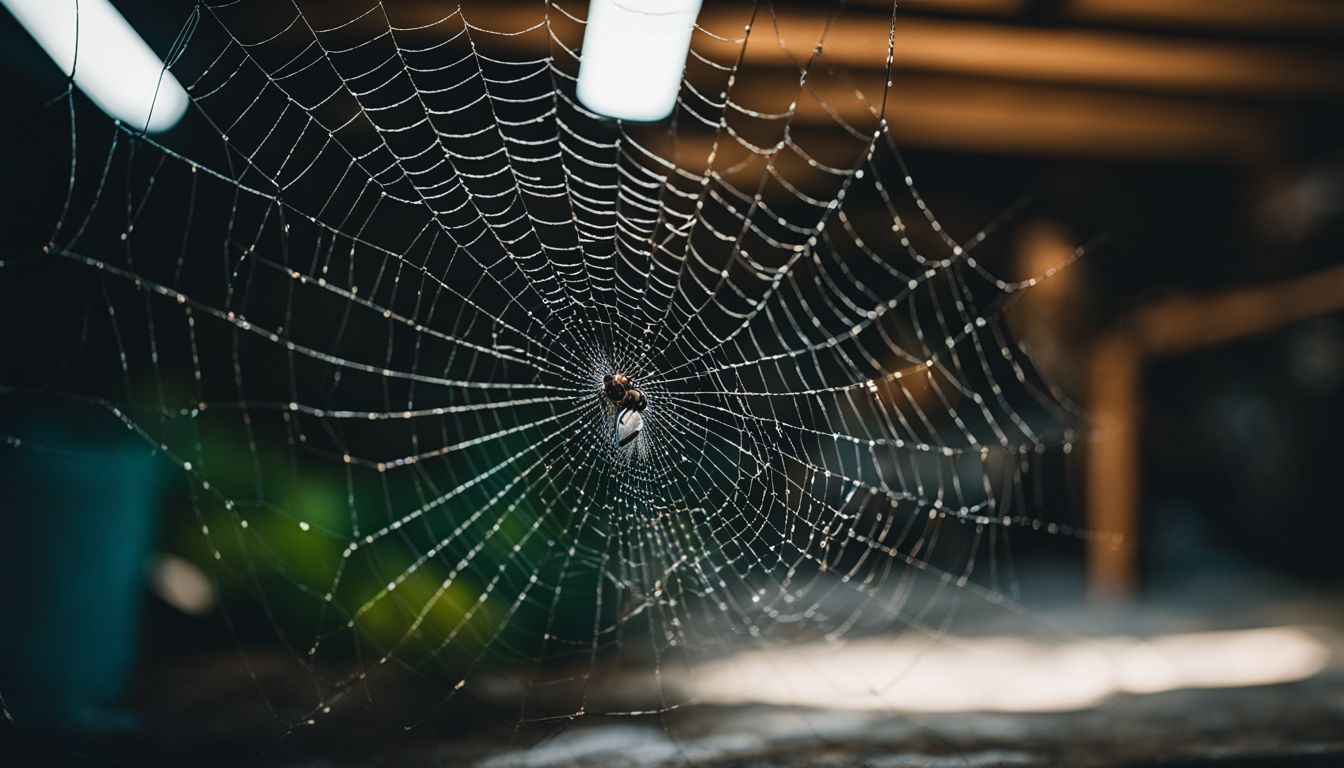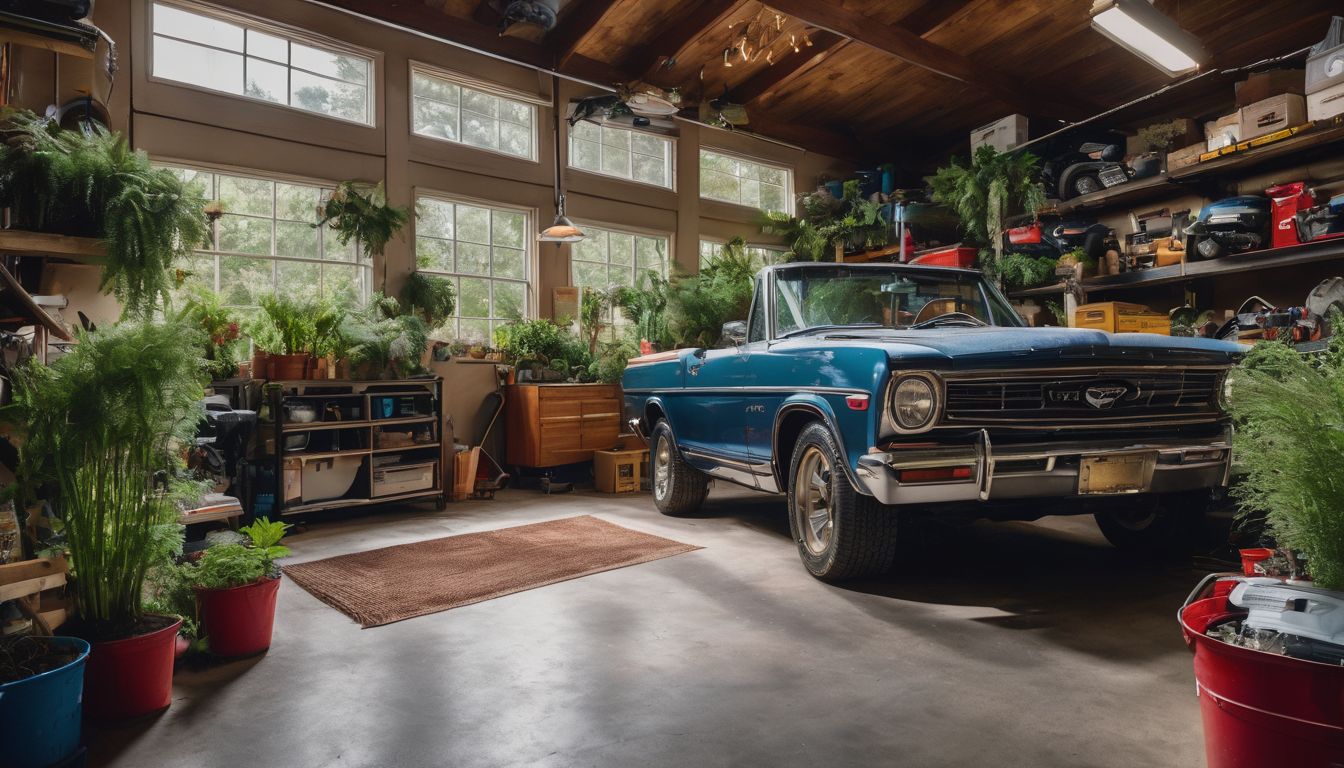Spiders in the garage can be a real nuisance, often hiding in corners or scaring us when we least expect it. Did you know that simple changes like adjusting your garage’s lighting can make it less inviting to these eight-legged guests? Our blog is packed with user-friendly tips and tricks to help you keep those creepy-crawlies at bay.
Keep reading to transform your garage into a spider-free zone!
Key Takeaways
- Use warm, yellow lighting in the garage to deter spiders and opt for amber LED lights, which can help make the space less inviting to these pests.
- Seal entry points by caulking gaps around windows and doors, installing door sweeps, covering vents with mesh screens, and filling wall holes with foam insulation or wire mesh to prevent spiders from entering.
- Implement natural repellents like peppermint oil or other essential oils such as tea-tree, lavender, or rose known to repel spiders. These can be effective when sprayed in areas frequented by spiders.
- Regularly inspect your garage for cracks and crevices that could serve as spider entry points and regularly clean to remove webs and egg sacs while keeping a tidy environment.
Understanding Why Spiders Enter Garages

Spiders enter garages for various reasons, including seeking shelter, hunting for food sources, and finding dark, undisturbed areas. Understanding these motivations can help in developing effective strategies to keep them out.
Seeking shelter
Garages are quiet places with lots of dark corners. They make great homes for spiders who love calm and shadowy spots. Spiders like to hide in these areas because they can rest safely and come out only when they need to catch food.
Also, garages often have things stored away that aren’t moved much, giving spiders the perfect spot to set up their webs without being disturbed. Keeping your garage tidy and less inviting can help prevent these eight-legged guests from choosing your space as their home.
Hunting for food sources
Spiders wander into your garage looking for snacks. These snacks are other bugs that might be hiding there. If you get rid of these pests, the spiders won’t have anything to eat and may stay away.
Think about using safe bug sprays or traps to cut down on the number of insects in your garage. Without a food source, you make your space less welcoming to spiders.
Taking this action can help keep eight-legged guests out. Now let’s look at proven strategies for keeping these crawly critters away from your garage for good.
Finding dark, undisturbed areas
After looking for food, spiders seek out quiet spots to settle down. Garages are perfect because they’re often dark and full of places that don’t get disturbed much. This is why you might find a black widow spider there.
They love dry, shadowy corners where they can be alone. Keeping your garage bright and checking all the hidden spots can make it less inviting for these eight-legged guests.
Proven Strategies to Keep Spiders Out

Seal entry points to eliminate access and opt for warm, yellow lighting to deter spiders. Implement natural repellents like peppermint oil to keep spiders away from your garage space.
Seal entry points to eliminate access
To keep spiders out of your garage, it’s important to seal off any entry points they might use to get inside. Here’s what you can do:
- Use caulk or weather stripping to seal gaps and cracks around windows and doors.
- Install door sweeps to block the space at the bottom of the garage door.
- Cover vents with fine mesh screens to prevent spiders from entering through them.
- Fill in any gaps or holes in the walls with foam insulation or wire mesh.
Opt for warm, yellow lighting to deter spiders
Use warm, yellow lighting in your garage to keep spiders away. Spiders are attracted to light but they don’t like warm and yellow lights, so using them can help deter spiders from entering your garage.
LED lights with warmer colors can also attract bugs and spiders, so choosing warm yellow or amber LED lights can make a difference.
Remember that using the right kind of lighting can play a significant role in keeping spiders away from your garage space. Now let’s move on to the next step in preventing these unwanted guests!
Implement natural repellents like peppermint oil
To complement the use of warm, yellow lighting to deter spiders from your garage, you can also implement natural repellents like peppermint oil. According to a study, peppermint oil has been found effective in repelling spiders.
You can create a simple homemade spider repellent by mixing 10-15 drops of peppermint essential oil with water in a spray bottle and then spraying it in places where spiders are likely to frequent.
Another method involves adding 5-7 drops of peppermint oil into a spray bottle filled mostly with warm water along with a small amount of dish soap. Other essential oils such as tea-tree, lavender, and rose have also been known to keep spiders away.
Specific Tips on How to Get Rid of Cellar Spiders
Cellar spiders, also known as daddy longlegs, are commonly found in garages. Here are some specific tips to get rid of them:
- Use a vacuum cleaner with a hose attachment to remove cellar spiders and their webs from corners and ceilings. This can effectively eliminate existing spiders without using chemicals.
- Seal cracks and crevices in walls, floors, and windows where cellar spiders may enter the garage. Pay close attention to areas around pipes and utility entrances.
- Place sticky traps or glue boards near areas where you have seen cellar spiders. These traps can catch spiders that are difficult to reach with a vacuum.
- Keep the garage dry by using a dehumidifier if necessary. Cellar spiders thrive in damp environments, so reducing moisture levels can make the garage less appealing to them.
- Consider implementing natural repellents like citronella oil or other aromatic herbs known for deterring insects. Simply dab some on cotton balls and place them strategically around the garage.
- Remember to regularly inspect the garage for signs of new spider activity, such as webs or egg sacs, and take proactive measures to address any issues promptly.
Maintaining a Spider-Free Garage
Organize tools and minimize clutter to eliminate hiding spots for spiders. Use sealed storage solutions to prevent spiders from nesting in boxes or containers. Regularly clean the garage to remove webs and egg sacs, reducing potential spider habitat.
Organize tools and minimize clutter
To keep spiders out of your garage, start by organizing tools and minimizing clutter. Here’s how to do it:
- Clear away unnecessary items and keep the space tidy to prevent spiders from finding hiding spots.
- Store tools in sealed containers or on racks to limit dark, undisturbed areas where spiders may settle.
- Regularly sweep and vacuum the garage floor to remove any potential spider habitats.
- Consider using plastic storage bins instead of cardboard boxes, as they are less attractive to pests.
- Implement effective pest control measures like sealing cracks or crevices where spiders could enter.
Use sealed storage solutions
To keep your garage spider-free, another effective strategy is to use sealed storage solutions. Airtight plastic containers are a great alternative to cardboard boxes because they make it harder for spiders and other insects to access your belongings.
By keeping your items in sealed containers, you can prevent pests from making themselves at home in your garage. This simple switch can help maintain a clean and organized space while deterring unwanted guests like spiders and other pests.
Additionally, using plastic storage bins instead of leaving items out in the open minimizes hiding spots for spiders, making it easier to spot any potential pest infestations early on.
Regularly clean to remove webs and egg sacs
After implementing sealed storage solutions, it’s important to regularly clean the garage to keep spiders away. Regular cleaning helps maintain a spider-free environment by eliminating webs and egg sacs. Here are some ways regular cleaning can help:
- Use a vacuum or broom to remove spiders, webs, and egg sacs from corners and ceilings.
- Regularly sweep windows, seldom used areas, and corners of rooms to eliminate spiders and their webs.
- Ensure that outdoor lighting fixtures are free from webs and egg sacs by cleaning them regularly.
- Wipe down surfaces with a damp cloth to remove spider webs and discourage spiders from nesting.
The Importance of Regular Garage Inspections
Regularly inspecting your garage for cracks, crevices, and signs of spider activity is crucial in preventing infestations. By staying proactive and addressing any potential entry points, you can maintain a spider-free environment in your garage.
Checking for and sealing cracks or crevices
To keep spiders out of the garage, it’s important to inspect for and seal any cracks or crevices that could serve as entry points. Here are some steps to ensure a spider-proof environment:
- Inspect the walls, foundation, and around windows and doors for any visible cracks or openings.
- Use steel wool or caulk to seal off these areas, as spiders can exploit even tiny gaps.
Looking for signs of spider activity
After sealing cracks and crevices, it’s essential to remain vigilant for signs of spider activity in the garage. Look for webs, egg sacs, or shed skin to identify their presence. Check dark corners, behind stored items, and along the ceiling where spiders tend to build their webs.
Additionally, keep an eye out for any insects that may serve as a food source for spiders.
Regularly inspecting these areas will help you catch and address any spider infestations before they become more significant problems.
Conclusion
In conclusion, keeping spiders out of your garage is possible by sealing entry points and using warm yellow lighting. Natural repellents like peppermint oil can also help deter spiders.
By organizing and cleaning the garage regularly, you can maintain a spider-free space. Regular inspections and maintenance are important in preventing spider infestations.
For detailed instructions on dealing with these specific arachnids, be sure to check out our guide on how to get rid of cellar spiders.
FAQs
1. What can I use to keep spiders away from my garage?
You can use insect repellent sprays that spiders don’t like the smell of to help keep them away from your garage.
2. Will turning off lights stop spiders from coming into my garage?
Yes, because spiders are drawn to artificial lights which attract their prey, like the whitefly. Using less light might make fewer insects and spiders come in.
3. Can I find a natural way to stop spiders without using chemicals?
Certainly! Spiders dislike certain smells and fragrances, so you could try using things with strong scents they don’t like as a natural spider repellent.
4. Does having predators around help control spider numbers in my garage?
Sure does! Predatory creatures that eat bugs, including brown recluse spiders, may be helpful by cutting down the number of those unwanted guests in your space.




